Apply to a foreign university with confidence
- Properly fulfilled documents
- Perfect motivation letter
- Support from a personal mentor
- Offers from several universities
Article score: 4 out of 5 (6 reviews)
Why University of Oxford? Fees and interesting facts about the University of Oxford. Programs and admission requirements at Oxford University
Free consultation Are you a representative of this institution?1096 – The first mention of studies being conducted in Oxford[1].
1167 – The rapid growth and development of the university are connected to King Henry II who prohibited teaching subjects of England at the University of Paris[1].
1248 – The Royal Charter formally assigned a university status to an educational institution. Theology, medicine, law, and free sciences are taught here[2].
The second half of the XIII century. The study of theology is actively developing and the first colleges are being formed. Until the 18th century, Oxford was involved in many political and religious disputes, but never stopped its educational activity and did not lose the status of one of the most important universities in the British Isles.
XIV-XIX centuries. Oxford and Cambridge have a monopoly on higher education – the creation of other universities in England is prohibited until the 1820s[3].
During World War I, Oxford lost about 40% of its students at the frontlines. After that, the university experienced significant modernization and began to train specialists in almost all fields of study. The learning process has become more systematic, which over time allowed to make the university one of the foremost scientific centres in Europe.
For almost all of its history, there has been gender inequality at the University of Oxford. In 1879, the first women's college was founded, and only in 1974, Oxford began to accept students, regardless of gender. Last female Oxford college opened its doors to men only in 2008[1].
Today, the university is not only one of the most prestigious, but also one of the most international universities in the world: 20% of bachelor’s students, 64% of graduate students and 41% of university employees came from other countries[4].
The University of Oxford is one of the most prestigious universities in the world, located in the South East of England. Oxford University is one of the seven "ancient universities" of Great Britain and Ireland and is considered the very first university of the British Isles. Oxford is a part of The Russell Group, which consists of 24 of the best universities in England[5]. Today, the University of Oxford ranks first in the world according to the Times Higher Education (THE)[6] international ranking and it is fourth after MIT, Stanford and Harvard, according to QS ranking[7]. More than 70 Nobel Prize laureates and other prized specialists worked here at different times[8]. Except for medical specialties, the university does not have quotas for the admission of foreigners[9].
| Subject | Place in QS 2024 |
|---|---|
| Anatomy & Physiology | 1 |
| Life Sciences & Medicine | 2 |
| Social Sciences & Management | 2 |
| Arts & Humanities | 3 |
| Engineering & Technology | 3 |
| Natural Sciences | 3 |
| Accounting & Finance | 4 |
Oxford is somewhat similar to a small federal state: in addition to the central university, there are 38 Oxford Colleges and 6 Permanent Private Halls which enjoy self-government and financial independence. That being said, Oxford colleges are unique multidisciplinary academic communities: they have no particular specialization, so a college student can study at any of the approximately 100 academic departments[12] from theology and Oriental studies, to genetics and IT. All of them are united in four major areas:
In any scientific field, Oxford usually does not place lower than tenth in international ratings[13].
The University also has the Department for Continuing Education, which offers online or part-time courses, summer schools, continuing education programs, etc.
There is a division of roles between the central university and its departments:
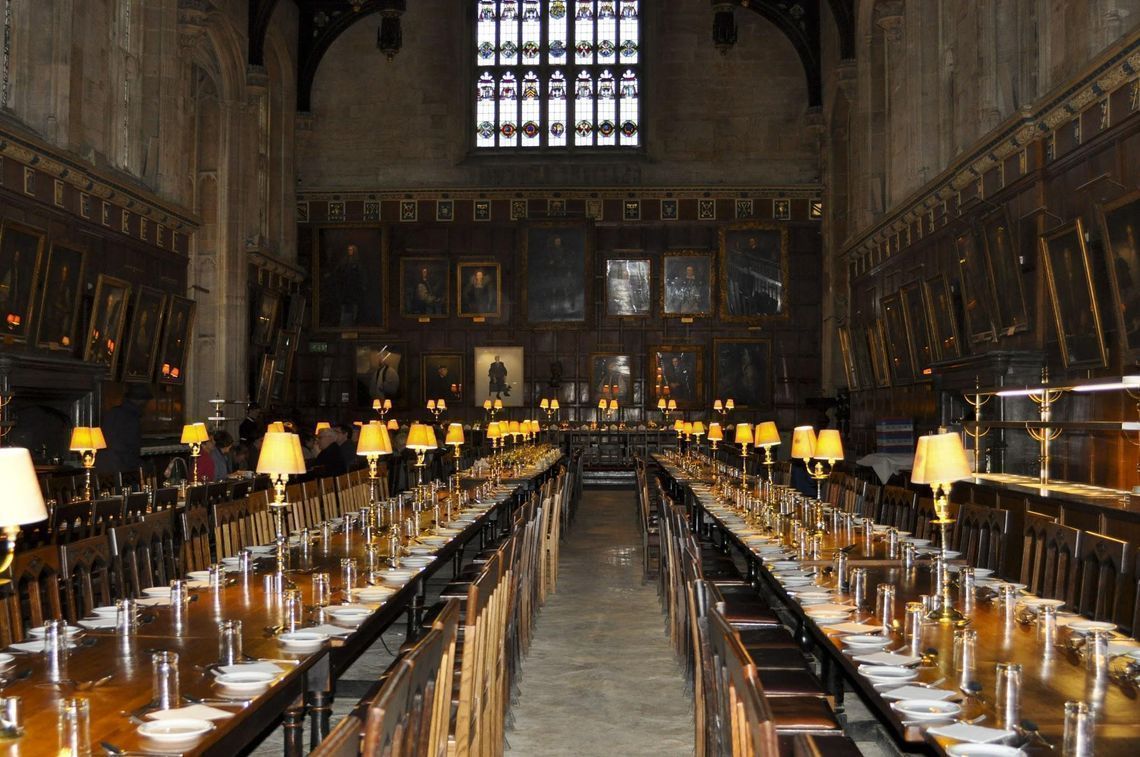
Classrooms and canteens of some colleges can be seen in a series of movies about the young wizard Harry Potter. Most often, the dining room of Christ Church College was shown in them.
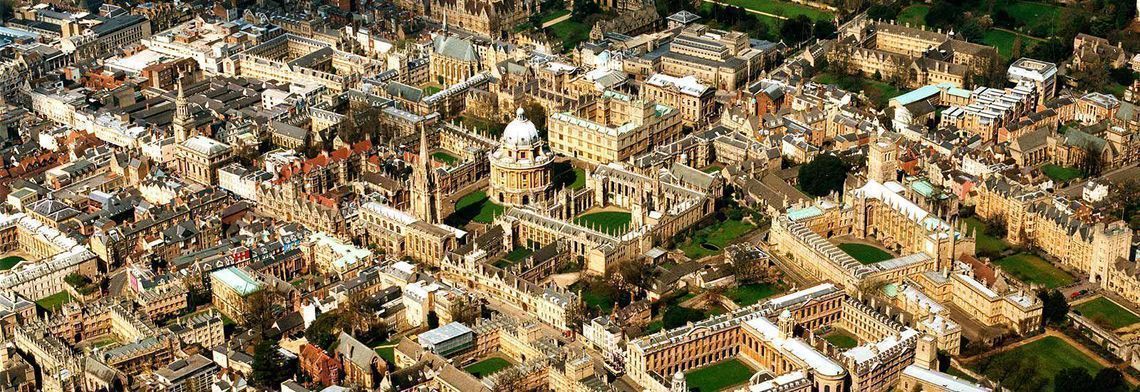

| Type of studies | Age | Duration | Min. cost/year | Avg.cost/year |
|---|---|---|---|---|
| Bachelor’s | 17+ | 3 years | 34,082 USD | 40,384 USD |
| Master's | 20+ | 1-2 years | 29,196 USD | 36,544 USD |
| Doctoral | 21+ | 3 years | 27,700 USD | 33,333 USD |
* It is necessary to check the current data on the university website.
| Item | Minimum cost | Average cost |
|---|---|---|
| Accommodation | 7,507 USD | 8,282 USD |
| Meals | 3,217 USD | 3,906 USD |
| Household expenses | 1,549 USD | 2,238 USD |
| Travel expenses | 662 USD | 927 USD |
| Leisure | 536 USD | 927 USD |
| Study materials | 477 USD | 669 USD |
| Health insurance | 199 USD | 199 USD |
| Other | 238 USD | 450 USD |
| Total per year | 14,386 USD | 17,597 USD |
Colleges provide a dormitory to all bachelor’s students for a minimum of two years (freshman and one of the following years). As for master’s and doctoral students, the university cannot provide rooms for everyone – only 72% of the first-year students receive them every year[14].
College dormitories offer a range of accommodation options: from single rooms to full-fledged apartments, on or off-campus. Due to this, the prices may vary. If there are not enough rooms, the student can contact the Graduate Accommodation Office to help them find private housing, which should not be further than the specified distance[11].

The procedure for admission to Oxford may vary depending on the level of education and the direction of study. One of the common requirements for all foreign applicants is a high level of English proficiency. As evidence, you must provide the results of international exams. Minimum requirements depend on the field of study and the program – some set standard level scores, some – higher-level scores. So, the admissions committee will require the student to have at least 7.5 for IELTS for a bachelor's degree in English literature, but you can get a master’s in organic chemistry with only IELTS 7.0 result.
| Test/certificate | Standard threshold | Increased threshold |
|---|---|---|
| IELTS | 7.0 | 7.5 |
| TOEFL iBT | 100 | 110 |
| C1 Advanced (CAE) | 185 | 191 |
| C2 Proficiency (CPE) | 185 | 191 |
| EB (European Baccalaureate) | 70% in English | 70% in English |
More details on the official website.
The United Kingdom does not recognize high school diplomas of graduates from several countries. If that is the case, for admission you will have to go through special preparatory courses.
| Course | Age | Duration | Min. grade | Avg. cost |
|---|---|---|---|---|
| A-Levels | 16–18 years | 2 years | A * AA | 33,102 USD |
| Foundation | from 17 years | 2 years | - | 19,861 USD |
A-levels is a compulsory training course for UK applicants preparing them for admission to universities. As a result of the course, a General Certificate of Education Advanced Level is issued. The duration of this program is 2 years. Students are free to choose the academic subjects that they need for further admission to universities in the UK – these are, as a rule, 3-4 disciplines that will be required for further education. A-Levels program consists of three semesters, after completion of training, graduates of the course pass exams, which, in turn, are accepted at the universities of Great Britain as entrance exams. Correspondence of disciplines with educational programs can be checked on the official website[16].
| A-levels grades | Admitted |
|---|---|
| A*A*A* | 42.3% |
| A*A*A | 26.2% |
| A*AA | 19.4% |
| AAA | 6.5% |
| The rest | 5.6% |
In 2018, the competition for the bachelor’s programs of Oxford was about 20000 students for 3250 places[17]. You can prepare an application for admission immediately after the end of the first year of the preparatory program or after the first year at a university in the country of residence. An applicant does not have to immediately choose a college: you can submit an open application, based on which the university will offer you a list of options for admission.
The admission process to the bachelor’s programs at Oxford University includes the following steps:
| No | Stage[19] | Deadline |
|---|---|---|
| 1 | Start of document preparation for the UCAS | June (one year before the start of studies) |
| 2 | Deadline for applying for UCAS and registration for the admission tests | October 15 18:00 |
| 3 | Admission tests[20] | October 30 |
| 4 | Deadline for the submission of written work[21] | November 10 |
| 5 | Interview | December 1–20 |
| 6 | Commission decision | January 14 |
| 7 | Start of studies | on October 8 |
All documents are provided in English. Documents in other languages must be translated and notarized.
The specifics of applying to graduate studies at the University of Oxford also depend on the study program. In some cases, the applicants are required to provide GRE or GMAT results. You can learn more about the requirements on the official website.
The process of enrolling in a master’s or doctoral program at the University of Oxford consists of the following steps:
Each program at Oxford has one or more deadlines for accepting applications:
The general list of documents:
Additional documents depending on the chosen speciality may include:
All paper documents must be scanned for uploading. If uploading is not possible, the documents are sent by mail, but it must come to the university before the deadline. Uploaded applications that do not comply with the rules and do not meet the deadline are not considered. The list of documents and the requirements for their presentation should be clarified on the official website.
Before applying for a PhD (in Oxford the name DPhil is often used), it is recommended to do the following:
The research proposal is one of the most important documents that must be submitted for admission to the PhD program. With its help, the candidate convinces representatives of the university that his work is valuable and can, therefore, benefit the university.
Basic requirements for the research plan[22] include the following:
| Indicator | Bachelor’s[23] | Master’s and PhD programs[24] |
|---|---|---|
| The total number of applicants | 21515 | 26914 |
| Received an invitation | 17.8% | 33.6% |
| Accepted | 15.4% | 21.8% |
| Foreigners | 22.4% | 64.8% |
| Female to Male ratio | 51.2%/48.8% | 46.9%/53.1% |
In 2018 the selection committee of the University of Oxford received more than 45000 applications for admission, but most of the candidates are eliminated at the first stages of the competition. Most international students at Oxford come from China, the USA, Singapore, Hong Kong, and Germany.
| Program | Competition, applicants/place[23] |
|---|---|
| Economics and management | 15.3 |
| Informatics | 14.2 |
| Medicine | 10.7 |
| Biomedical sciences | 9.8 |
| Mathematics and computer science | 8.4 |
| History and political science | 8.2 |
| Philosophy, politics and economics | 8.2 |
| Mathematics | 7.8 |
| Law | 7.7 |
| Physics | 6.7 |
| Program | Share of applicants | Competition, applicants/place |
|---|---|---|
| Social sciences | 48.4% | 4.6 |
| Humanities | 14.7% | 4.2 |
| Mathematics, physics and natural sciences | 21.2% | 5.6 |
| Medical sciences | 10.9% | 5.4 |
| Further education | 4.7% | 2.5 |

Education at Oxford is divided into trimesters, which are named after Christian saints as a tribute to the religious heritage of the university. Each trimester lasts for 8 weeks, during which the bulk of the lectures, workshops and seminars take place. The academic year in the University of Dublin is also divided into trimesters.
| Trimester | Dates |
|---|---|
| Michaelmas | October – December |
| Hilary | January – March |
| Trinity | April – June |
Some trimesters may be longer, depending on the study program. Sometimes students also stay in Oxford for about 10 weeks to do any additional written work or to help with interviews and open house days.
There are breaks between trimesters during which students usually go home, travel and/or get a job:
The exact dates of trimesters and vacations are determined several years in advance and are indicated on the website[25].
Most bachelor’s programs last for 3 years, in rare cases (mainly language specialities) 4-5 years. Training in some programs in the exact sciences also takes 4 years and graduates are awarded a master’s degree upon completion (MCompSci MEng MPhys). Medical education includes two levels, the first of which is implemented in bachelor’s studies: pre-clinical stage (3 years for studies at BA in Medical Science) and clinical stage.
Oxford's bachelor’s programs involve complete immersion in academic work – about 40 hours a week. As in many British universities, at the beginning of training, students learn compulsory courses, over time they are offered a large number of elective disciplines. A special role in the educational process is played by the personalized support from tutors who conduct individual consultations every week throughout the training period in groups of 2-3 students[10].
Examinations take place at the end of the first (Prelims/Moderations) and last (Finals) year of study. Sometimes colleges also conduct internal exams at the beginning of each trimester, known as collections, to track students' progress. However, they have no effect on academic performance.
Depending on the program, the degree is awarded on the basis of examination or writing a thesis or term paper. A full description of each course can be found on the website.
Oxford offers more than 350 graduate courses, among which it is not always possible to clearly distinguish master's and doctoral programs. In general, they are divided into two main groups: taught courses and research courses.
Taught courses usually take 9-12 months if studied full-time, less often 2 years. Most of the time, they involve the study of specialized disciplines aimed at gaining professional skills, then the students must write a dissertation with the support of an academic supervisor.
The main types of study programs at Oxford:
| Type | Degree | Duration | Final assessment |
|---|---|---|---|
| Master of Philosophy | MPhil | 2 years |
|
| Master of Studies | MSt | 1 year |
|
| Master of Science by coursework | MSc | 1 year |
|
| Master's-level degrees | BCL, BPhil, EMBA, MBA, MFA, MJur, MPP, MTh | Varies | Varies |
| Postgraduate Diploma / Certificate | PGDip / PGCert / PGCE | 1 year |
|
Research courses have more than 120 programs, including doctoral programs (DPhil). Within the framework of these courses, it is expected to create a full-fledged research project with the support of a supervisor. At the same time, students are given the opportunity to use the university's extensive research base. In many programs, students initially enrol as Probationer Research Students (PRS), then apply for DPhil and confirm the new status by defending the research plan and an interview.
Main types of research programs at Oxford:
| Type | Degree | Duration | Assessment stages |
|---|---|---|---|
| Doctor of Philosophy | DPhil | 3-4 years |
|
| Master of Science by research | MSc (Res) | 2 years |
|
There are also special four-year programs:
A full description of each course can be found on the website.
MBA program or The Executive MBA in Oxford will allow you to learn more about the intricacies of doing business abroad. Since 1965, Saïd Business School, which is engaged in the preparation of future masters in business management, operates as a part of the university. To enter the MBA, you must additionally pass GMAT or GRE exams, have at least a bachelor's degree in economics, law or business and have relevant professional experience. The remaining requirements are similar to other master’s programs. The cost of training is 75,737 USD per year. An MBA can be obtained both in one year by applying for Master of Business Administration or in two years at the more advanced Oxford 1 + 1 MBA course.
The University of Oxford collaborates with companies, universities and research institutes around the world, which allows its students to study abroad almost free of charge for their chosen specialization. Oxford offers an internship at the most prestigious universities in Europe and America (Australian National University, Princeton University, Peking University, Kyoto University, etc.), visit a summer school or go on an expedition for up to 5 weeks to one of the exotic countries. In addition, university students have the opportunity to participate in the program Erasmus+ and receive scholarships of about 678 USD per month.
The University of Oxford offers courses in individual disciplines as well as comprehensive continuing education programs. Despite the minimal live communication between the student and the teacher, distance learning courses help a huge number of people to get a world-class education. The average length of individual disciplinary courses is 1.5–2 months. During this time, you can learn to write English poetry, study the theory of knowledge or learn all about sleep deprivation. The cost of one course is from 331 USD. A complete list of online learning programs is available on the official website.
Most people think the University of Oxford is exclusively for wealthy students and royalty. On the one hand, this is quite reasonable: the cost of a course in Oxford can only be compared with the cost of studying in Cambridge, and 40% of first-year students come after finishing elite private schools[26]. On the other hand, like all leading universities, Oxford is interested in gathering the most brilliant students and thereby maintaining the status of one of the best universities in the world. Therefore, each student can apply for financial assistance – from special grants for citizens of underdeveloped countries to faculty scholarships for excellent academic performance or success in research.
In general, students of master's and doctoral programs have more opportunities to receive a grant compared to bachelor’s students. The university itself and private foundations offer financial assistance to young specialists (Hill Foundation Scholarships, Palgrave Brown Scholarship and others).
Scholarships can fully cover the costs of studying at Oxford University, and some grants even include funds for sightseeing and leisure trips.
On the official website, you can check the cost of the course and the scholarships available for it, as well as find a general list of grants and available scholarships from partners.

According to statistics, 91% of graduates of the University of Oxford find work within the first 6 months after graduation or continue to study further[4]. Employment assistance is provided by the university organization Career Service – it selects suitable vacancies, teaches students to prepare documents for employment correctly and plan their career.
| Industry | Share of employed graduates |
|---|---|
| Education | 14% |
| Banks and investment companies | 9% |
| Consulting | 8% |
| Government institutions | 7% |
| Media and journalism | 7% |
| Sports and tourism | 7% |
| Advertising, marketing and communications | 6% |
The Career Center has developed a special mobile application called Oxford Careers Fair Plus, which can be downloaded for free on the official website of the university. It allows you to find out all the necessary information about employers, new vacancies and future dates of job fairs.
It should be kept in mind that it is not so easy for foreigners to stay in the UK after graduation. Until recently, the only opportunity was to find work in a company that is a licensed sponsor – in just 4 months. However, starting in the fall of 2020, the British government resumes issuing the UK post-study work visa for graduates, which allows you to look for work for 2 years after graduation with the subsequent switching to a regular work visa.

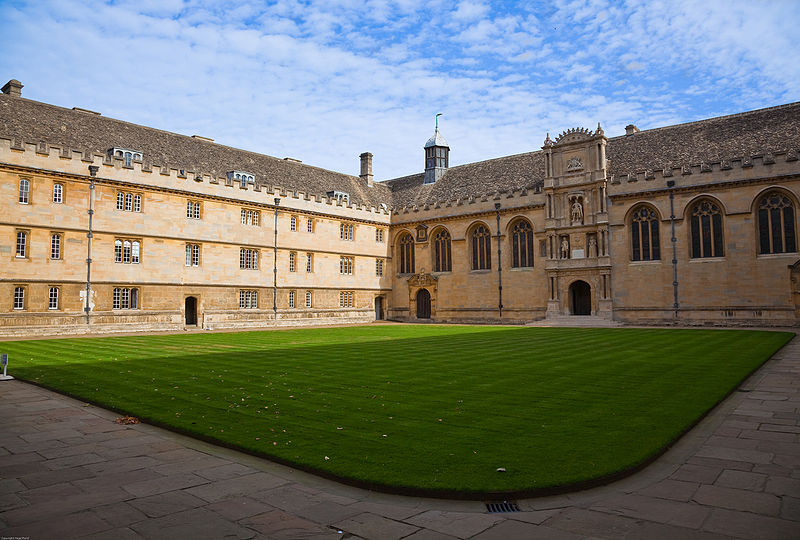
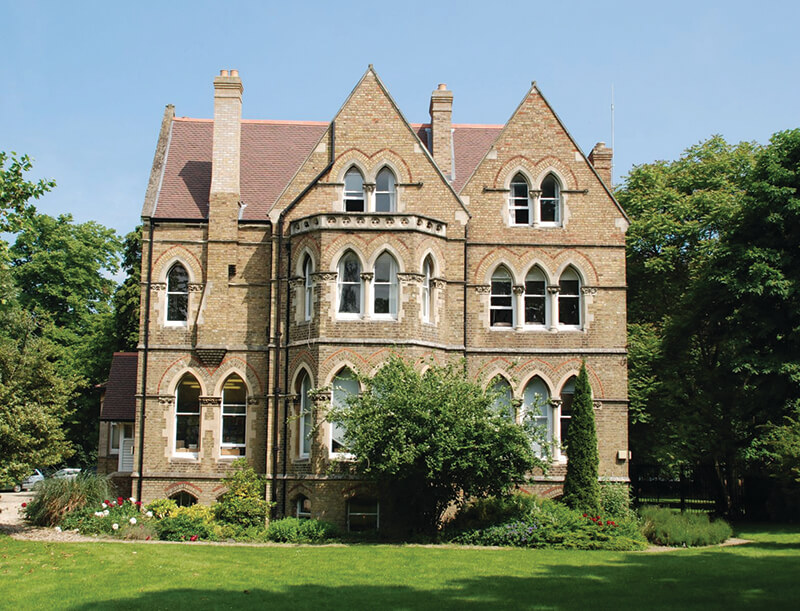
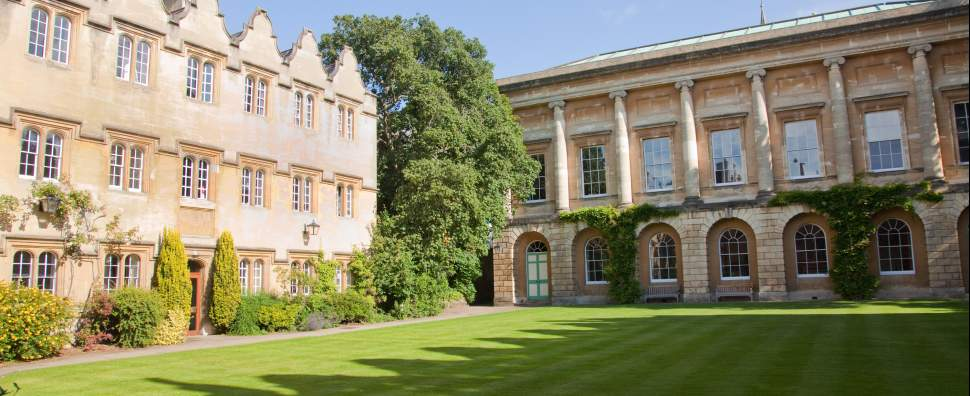
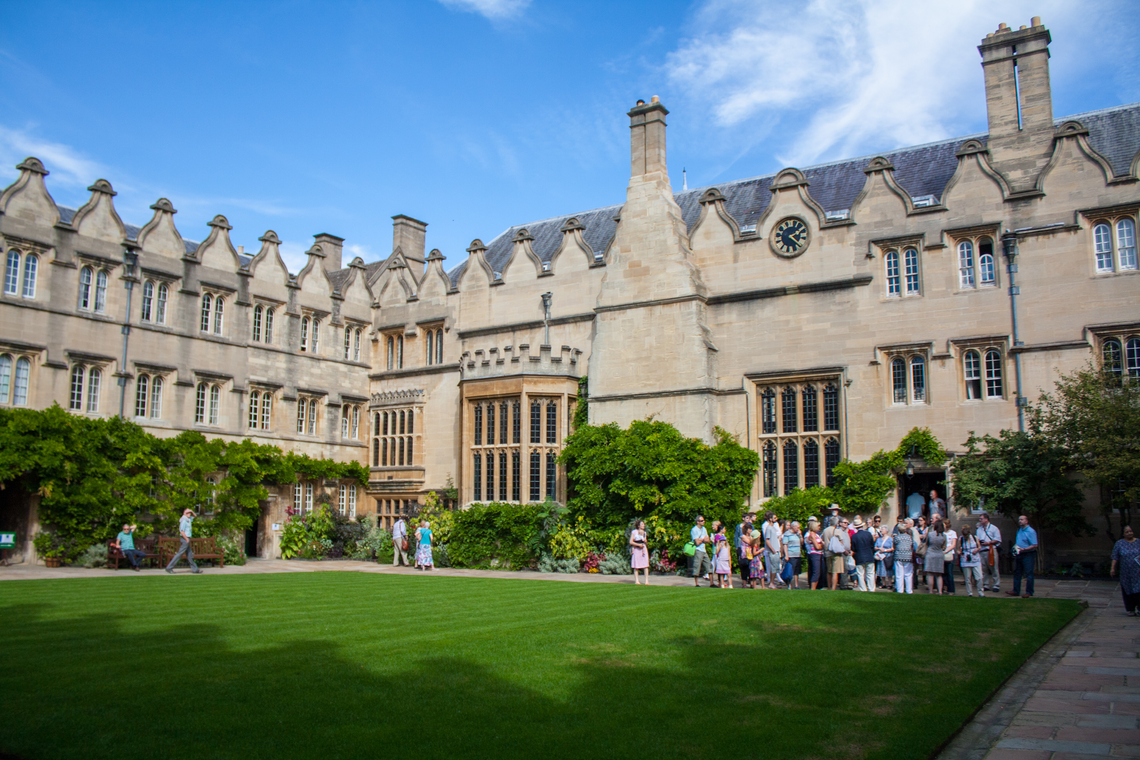
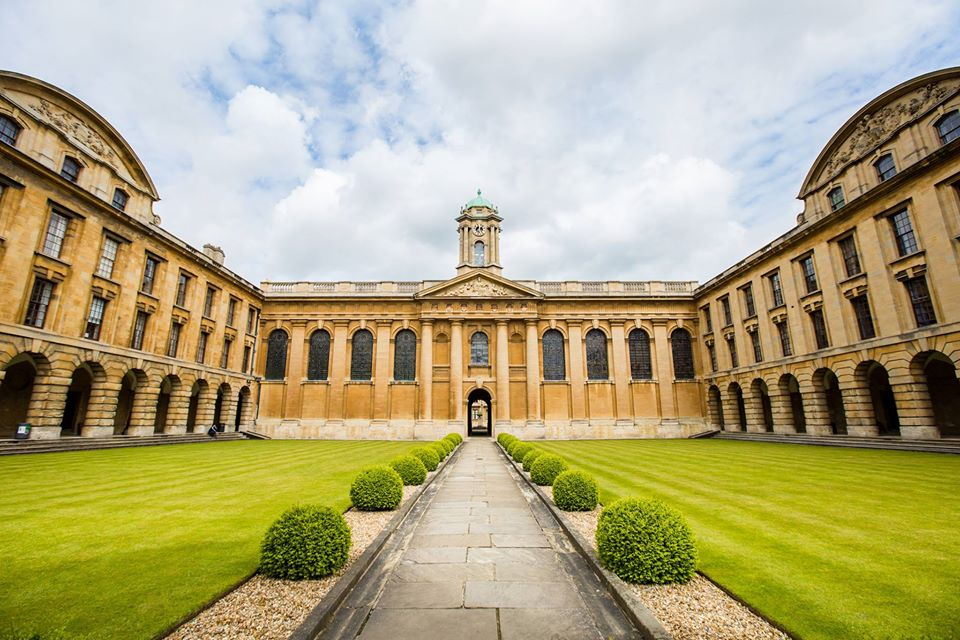
60+ countries
we work with
$1,000,000 saved
by students through scholarships
6,400 offers
our students got
Items 1-5 of 722
Advanced search